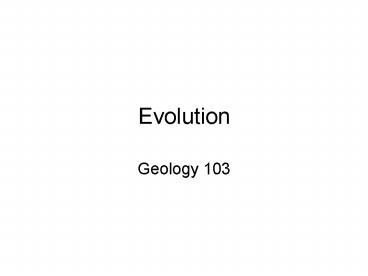Evolution - PowerPoint PPT Presentation
1 / 30
Title:
Evolution
Description:
Evolution Geology 103 ... 1859) publishes his theory of organic evolution based on observations he had made on the voyage of the Beagle and other work. – PowerPoint PPT presentation
Number of Views:170
Avg rating:3.0/5.0
Title: Evolution
1
Evolution
- Geology 103
2
Fossil classification
- Body fossils actual representation of the
organism preserved in the rock also includes
molds and casts - Trace fossils evidence of the passage of an
organism includes burrows, borings and tracks
3
Body fossil preservation
- Permineralization Dissolved minerals
precipitate in cavities within organism
4
Body fossil preservation
- Replacement Dissolved minerals precipitate as
organisms original materials dissolve
5
Body fossil preservation
- Carbonization Organisms tissues are compressed
and lose their volatile components, leaving
behind a carbon film
6
The key to good preservation
- Bury the organism quickly (anoxic conditions).
- Dont disturb it for a long time. This includes
plate tectonics.
7
Fossils
- Latin Dug up
- Represent any indication of past life
- Posed an issue for early geologists
- Some believed that fossils were rocks trying to
become living organisms - Aristotle to DaVinci agreed that they were
remains of past life
8
Neptunism
- School of thought about the origin of rocks that
arose in the late 18th century - Held that the world was inundated in a great
flood (or floods) that deposited every single
rock - Abraham Werner (Freiburg School of Mining, 1750
1817)
9
Plutonism
- Werner believed that the heat source for
volcanoes and other eruptive features were
burning coal beds - Others, notably James Hutton (University of
Edinburgh, 1726 1797), argued for magma as the
source for volcanoes - Culminated in debate over the origin of granite
- Hutton also known for his quote that in the rock
record we find no vestige of a beginning, no
prospect of an end
10
Catastrophism
- Baron Georges Cuvier (Museum of Natural History,
Paris,1769-1832) was the main proponent - Earth is immensely old but has recurring
revolutions that result in extinctions of
organisms
11
Faunal succession
Faunal succession is not evolution because faunal
succession makes no claims as to the connections
between organisms found in different layers.
12
How do organisms change over time?
- Jean-Baptiste Lamarck (Museum of Natural History,
Paris, 1744 1829) suggested that changes in the
environment caused changes in behavior of
organisms that resulted in physical changes in
those organisms that could be inherited by
offspring
13
First, we need to organize life
- Carl Linnaeus (University of Leiden, 1735)
publishes Systema Naturae, which categorized much
of what was being discovered of life on different
continents
14
Traditionally, the Linnean classification system
used anatomical differences to organize organisms
15
Uniformitarianism
- Key to the past is the present
- Charles Lyell (1830) publishes Principles of
Geology in which he advocates slow, gradual
changes in Earth processes, implying an immense
amount of time had already passed
16
On the Origin of Species
- Charles Darwin (Geological Society of London,
1859) publishes his theory of organic evolution
based on observations he had made on the voyage
of the Beagle and other work. - Check out my colleage Rob Viens daily
re-creation of the voyage http//beagleproject.wo
rdpress.com/tag/voyage-of-the-beagle/
17
The three tenets of Darwinian evolutionary theory
- There exists a group of organisms (population)
that mate and reproduce fertile offspring
(species) - Natural selection favors one variation over
another - The favored variation survives to produce more
offspring than unfavored variations
18
One method of speciation
- Allopatric speciation suggests that
geographically isolated populations may, through
genetic drift, become distinct species over time - Darwins finches
19
Adaptive radiation
- Rapid speciation may occur when extinction
vacates a lot of environmental niches.
20
Punctuated equilibrium
- In fact, we have been modifying Darwins theory
- In 1972, Neals Eldrege and Stephen Jay Gould
(Harvard) proposed that evolution of organism
occurs relatively rapidly during periods of
environmental stress, and that most species stay
static otherwise
21
Ideally, in the rock record...
- One would see a succession of evolved forms of
the same type in successive layers
22
But, in the real world,....
- Unconformities may remove the evidence of
transitional species - Also, sometimes hard to tell apart from rapid
speciation.
23
Cladistics the science of organizing organisms
by evolutionary history
24
Cladistics the science of organizing organisms
by evolutionary history
25
Cladistics are based on shared evolutionary
history
- This can be traced in many ways for instance,
the traditional anatomical methods or (more
recently) DNA analysis
26
How to tell clades from non-clades
- Recall that a clade is a group of organisms that
all share a common trait
27
Now most clades dont change much over time
- This is because most organisms do not need to
rapidly adapt or speciate during times of
environmental stability
28
Cladistics leads to some interesting results
No such clade as reptiles
Dinosaurs arent extinct
29
And we arent that closely related to chimps
anyway
- Cladistics can reveal the evolutionary history of
even closely-related organisms
30
Clades over time
- Of course, you can add a numbers to the vertical
time axis on a cladogram

